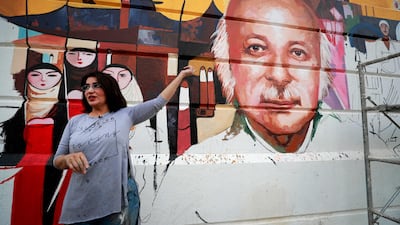Muthaffar Al Nawab died on Friday, aged 88.
The revered Iraqi poet reportedly died at the University Hospital Sharjah, after a prolonged illness.
The news marks the end of an eventful life in which his roles spanned those of a teacher, critic and civil servant to prisoner and exile.
Nicknamed the "revolutionary poet", Al Nawab gained most of his renown and notoriety for poems decrying corrupt regimes across the Arab world.
News of his death resulted in colleagues and admirers taking to social media to pay respects, posting videos and selections of his poetry.
Jordanian poet and novelist Ayman Otoom posted a favourite verse of Al Nawab: "Glory be to you and I am satisfied with all things except humiliation.”
Saudi publishing house Adab described Al Nawab's death as a sad day for all lovers of Arab poetry.
"The great Iraqi poet Muttaffar Al Nawab died today at the age of 88, after a life full of poetry and political events," read the statement.
“He suffered from illness for a long time and finally got off his horse, moving to the mercy of God. Condolences to Iraq and to all poetry lovers in the Arab world.”
Born into an affluent family in Baghdad, Al Nawab exhibited a talent for poetry from a young age and after graduating from the University of Baghdad, he became a teacher.
His leftist political leanings — he joined the Iraqi Communist Party while in university — landed him in trouble, with Al Nawab eventually fired from his position.
With the growing power struggle between Iraqi nationalists and communists, in the wake of the 1958 Iraqi revolution, Al Nawab was arrested and handed a death sentence — later commuted to life imprisonment — for a poem published against the nationalist government.
In Beth K Dougherty and Edmund Ghareeb's extensive 2013 book Historical Dictionary of Iraq, the historians recall how Al Nawab and other inmates managed to escape the prison by digging a tunnel and fleeing through the marshlands.
While Al Nawab's life was one of constant movement — having lived in Syria, Egypt, Lebanon and Eritrea — he continued to write and perform his work across the Levant region.
YouTube has many videos of his performances, stretching as far back as two decades, where he read his poetry to audiences, including at a university auditorium in Damascus in 2001.
In 1996, an Arabic collection of his work was released by the UK publisher Dar Qanbar.
Al Nawab's life has been honoured with a colourful mural in Baghdad, commissioned by Baghdad mayor Alaa Maan.
Al Nawab is one of many murals dedicated to Iraqi notables including Jawad Salim, considered the father of Iraqi modern art and a celebrated sculptor, and another to the late, world-famous Iraqi-British architect Zaha Hadid.


